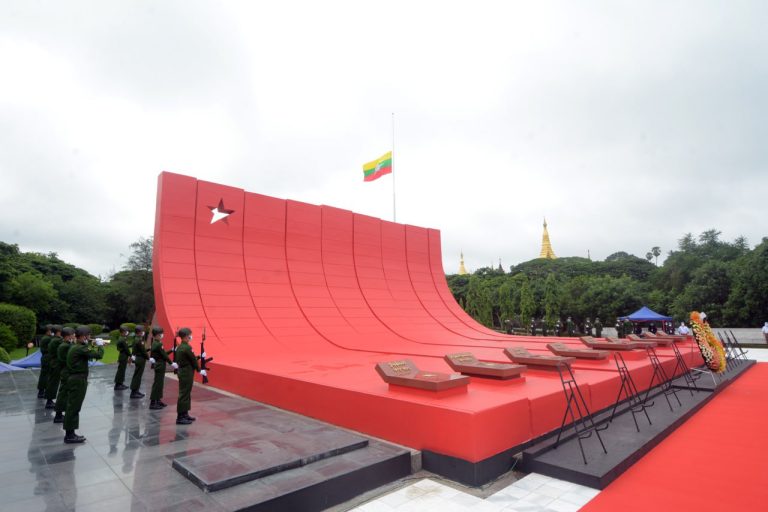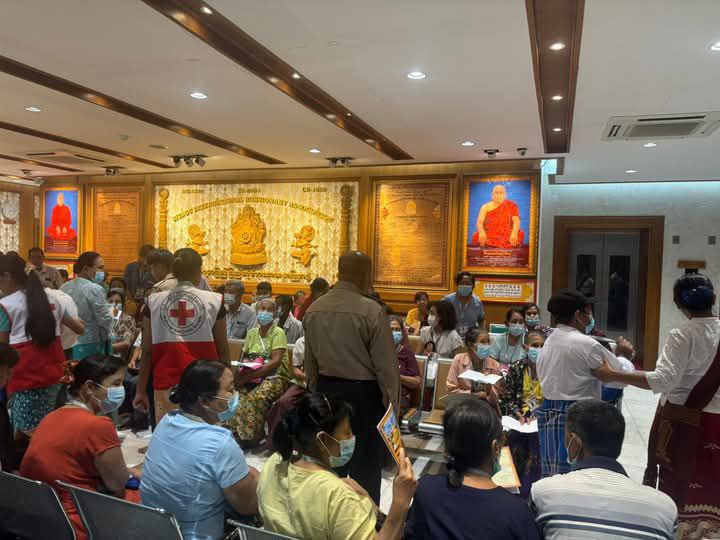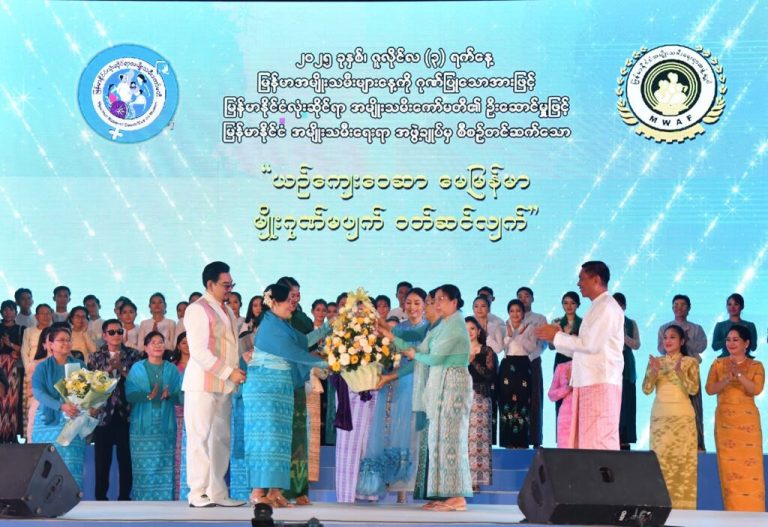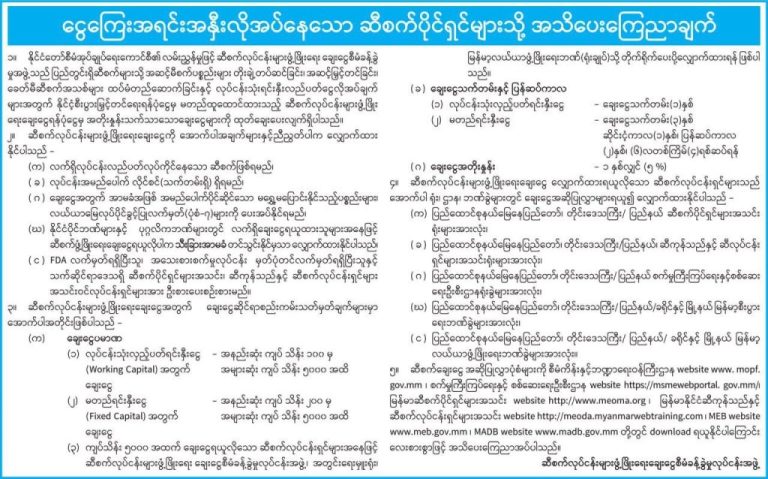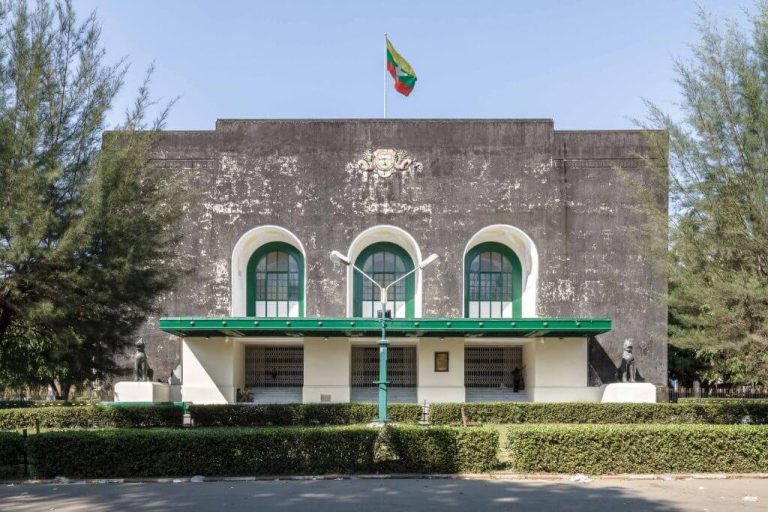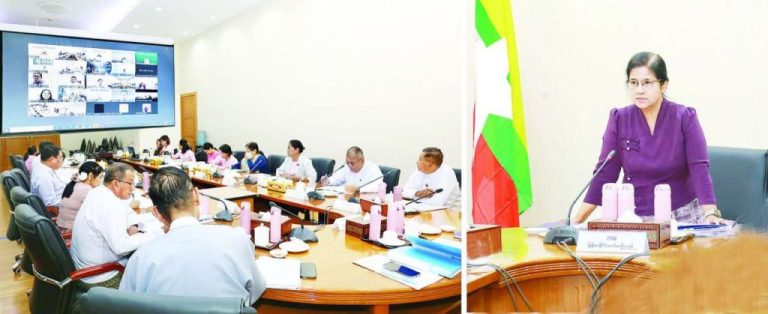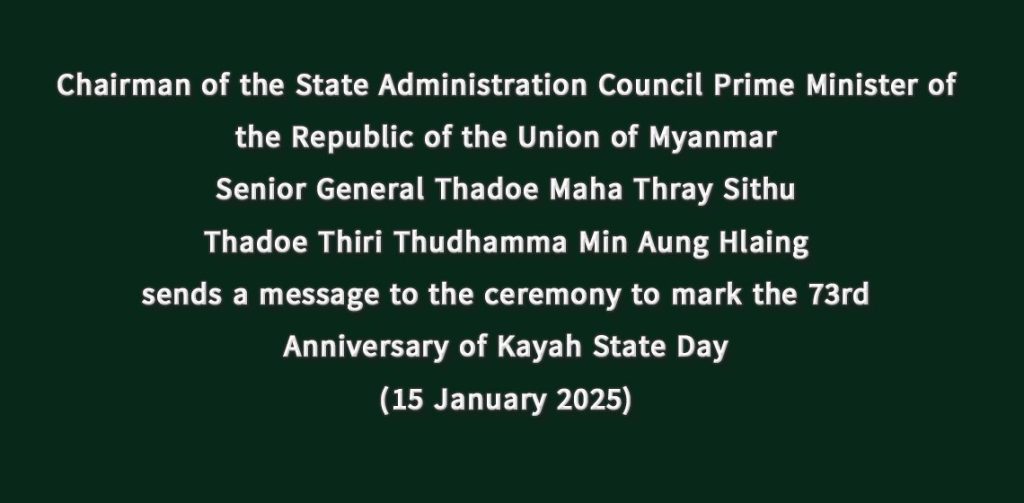
15 January 2025
Esteemed ethnic national brethren in Kayah State,
Today, 15 January 2025, is Kayah State Day, filled with auspiciousness for the national brethren and the Kayah ethnic people in Kayah State.
On this significant occasion, which coincides with the New Year festivities, I extend my heartfelt wishes for good health, peace of mind, and prosperity to all Kayah ethnic people and all citizens of the Union.
Kayinni State, which was included as a state under the Constitution 1947, was officially rechristened Kayah State through public consensus under the Constitutional Amendment Act in 1951. This change became effective on 15 January 1952.
The date of this renaming was designated as “Kayah State Day.”
Kayah State is a region of stunning natural beauty, featuring mountains, forests, water bodies, and an abundance of natural resources both above- and underground. It is also enriched with a vibrant cultural heritage. The temperate climate, coupled with the warmth, friendliness, and honesty of the local ethnic communities, are among the state’s most charming attributes. Furthermore, the collaborative efforts of the local ethnic populations for the benefit of the state have enabled it to develop and establish a strong foundation. Building on this foundation, it is crucial for the ethnic communities within Kayah State to work together with the national government to achieve lasting peace, stability, and sustainable development. This collective effort is essential to ensure that future generations can continue to enjoy the fruits of durable peace.
Our country has been a sovereign nation with its own unique culture, literature, and language for many centuries, where all ethnic brethren lived together harmoniously and unitedly in various regions of the country through thick and thin.
However, this unified and strong nation was unjustly invaded by the British colonialists through three aggressive wars starting in 1824, subjecting the country to servitude under their rule.
Subsequently, the territorial expansions were governed by laws that were distinct for each mountainous area, and for over a hundred years, colonialists administered with a clear intention of division. In ruling the country, they also carried out actions that further emphasized the differences and distinctions.
On 4 January 1948, after regaining independence, it was observed that the influence of political parties and their power struggles intensified. On 28 March 1948, the Communist Party of Burma, instead of resolving political differences through peaceful means, chose the armed struggle line as a strategy.
This marked the beginning of armed conflicts across the country, preventing the nation from experiencing the full benefits of independence. Similarly, due to the territorial disputes and the division of power, some ethnic groups also pursued armed struggle lines through various ideologies, which led to the country remaining in a state of instability and unrest, a situation that persists to present day.
Myanmar has experienced armed conflicts alongside its independence, and it has been over 76 years since these conflicts began. It is important to examine the reasons behind these ongoing armed struggles. Understanding the historical context allows us to recognize the shortcomings of past periods and will contribute to a better future. Political differences were not addressed through political means but rather through the armed struggle line, leading to internal armed conflicts. We must be aware that the lack of stability and peace continues to persist.
The current instability and terror acts occurring within the country are the result of individuals claiming to be promoting democracy, but instead, they have resorted to electoral fraud to unlawfully seize state power. Rather than resolving issues through lawful democratic methods, they have chosen armed terrorism approaches.
Some foreign countries, which claim to be defending democracy, are also supporting and encouraging armed terror attacks that are directly or indirectly against the democratic system.
It should be noted carefully that these actions aim to manipulate their countries to establish control and delay the people’s desire for a multi-party democratic system, ultimately supporting dictatorship disguised as democracy.
The government must continue to implement a genuine and disciplined multi-party democratic system, which reflects the will of the people. In order to implement this, necessary preparations are being made to hold free and fair general elections that allow for true representation of the people’s will.
It is emphasized that these elections will be conducted impartially and equitably.
The government is committed to working solely for the benefit of the nation and the ethnic people, striving to ensure the stability, peace, and prosperity of the country, and to provide sufficient resources for the people.
The government will continue to collaborate with the ethnic people to achieve these goals.
In accordance with the will of the ethnic people, it is necessary for the government, Tatmadaw, all civil servants, all civil society organizations, and the entire population to unite and work together to build a Union based on democracy and a federal system.
The key factor in reaching our goal is the unity and solidarity of all our ethnic groups, as well as the stability and peace of the nation.
In the current situation, we will witness the harmful effects of foreign countries’ interference, the actions of certain organizations that prioritize their own interests over the nation’s and people’s welfare, and false information that undermines the country’s stability. Due to the persuasion and terror acts committed by terrorist organizations such as the NUG, CRPH, and PDF, there will be misunderstandings and a disintegration of unity among the public in some regions, leading to ongoing unrest.
Recently, towns and villages, including Loikaw in Kayah State were damaged due to terror attacks by KNDF groups and PDF terrorists.
Armed terrorists living within the state have destroyed their own region.
For the development and peaceful stability of any region, it is essential that the people living there contribute.
The responsibility to protect the development and stability of the region lies with the local population, and they must prevent actions that would undermine the region’s peace and stability.
The participation of ethnic communities in terror attacks reflects a lack of national unity, immature political thinking, and betrayal of their own region and people.
Therefore, it is requested that all citizens work together to curb the terror actions of local armed groups that are undermining regional stability, peace, and the security of the local people.
These groups have taken refuge in homes in towns and villages, using civilians as shields and carrying out attacks with impunity.
If the public remains vigilant and cautious, efforts to dismantle these armed groups can be carried out more swiftly and effectively.
The key requirement for the development and progress of the nation and the establishment of a democratic State is the complete education and correct thinking of all the people.
The people must manage and protect the interests of the nation and public with knowledge.
The government must work to ensure that the people are well-educated, and that young people with abundant human resources emerge.
The education sector is being enhanced to support this goal, and I encourage ethnic people to actively participate. Efforts should be made to reopen closed schools, assist students who are unable to attend school due to various reasons to return to school, and ensure that every child of school age is able to attend school. Only then can young people be fully empowered and contribute to the well-being of the region, the nation, and the people.
Esteemed ethnic national brethren in Kayah State,
For a state to emerge as more peaceful, prosperous, and developed, the spirit and strength of all the national brethren living within the state are crucial.
Just as the strength of a nation comes from within the nation itself, the strength of a state also derives from the combined power of all its national brethren.
For the long-term stability and sustainability of the Union, with the duty of three key responsibilities at the forefront, may we protect and safeguard the nation and its people with the spirit of ethnic solidarity, unity, and the Union
spirit among the ethnic people.
Let us nurture and cultivate the younger generation, the future of the country, to become valuable human resources.
The ethnic people of Kayah State should also participate in the reconstruction process with correct ideas and concepts, working together in unity. I send this message to show my hope that the entire Kayah State will remain peaceful and prosperous, with all ethnic groups experiencing progress and improvements in their social and economic lives.
Senior General Thadoe Maha Thray Sithu
Thadoe Thiri Thudhamma Min Aung Hlaing
Prime Minister
Chairman, State Administration Council

